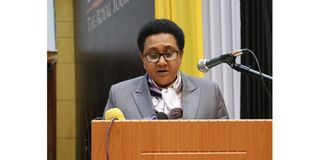Prime
Archiving the Rwanda genocide material in Tanzania

The Foreign Affairs and East African Cooperation minister, Stergomena Tax speaks in a press conference at the Arusha International Conference Centre (AICC). PHOTO | FOREIGN AFFAIRS MINISTRY
What you need to know:
- The archives which consists of million pages of court documents are yet to find a home with Tanzania being a keen potential host
Arusha. Tanzania is likely to be the depository of the Rwanda genocide archives, it has been revealed.
The Foreign Affairs and East African Cooperation minister, Stergomena Tax said the archives would be handed over to Tanzania after the conclusion of the cases.
She, however, hinted here at the weekend that it may be too early to discuss where the materials would be stored.
“The cases pertaining to the Rwanda genocide are still going on,” she told journalists at the Arusha International Conference Centre (AICC).
She was responding to questions from the media about the fate of the archives which have been the centre of a contest between Tanzania, Rwanda and the United Nations.
Dr Tax said to the best of her knowledge both the classified and declassified materials on the genocide would be handed over to Tanzania.
That is when all the cases on the 1994 horrific killings in Rwanda are concluded at the UN Tribunal’s facilities in Arusha and the Hague in The Netherlands.
The International Mechanism for Criminal Tribunals (or the Mechanism) took over the cases from the International Criminal Tribunal for Rwanda (ICTR) when the latter was disbanded in 2015.
The archive materials-bulky documents and video and audio tapes- are believed to be at the AICC where ICTR had its court chambers.
The minister said even if they are handed over to Tanzania, the materials would be shared with the rest of the world.
“These archives are unique because there had only been three such (genocide) tribunals in the history of humanity,” she said.
One of the archives has been dedicated to millions of Jews killed during the Holocaust. It is located at Auschwitz in Poland, once occupied by the invading Germans during World War II.
The other facility is being set up for cases filed at the International Criminal Tribunal for the former Yugoslavia (ICTY) against perpetrators of genocide in Bosnia-Herzegovina in the 1990s.
She said Tanzania was keen to transform the archives on the Rwanda genocide into a museum from where they will be shared with the rest of the world.
Dr Tax’s remarks came only three months after a senior official of the Arusha-based IRMCT (the Mechanism) said the archives in question remain to be the property of the UN.
Abubacar Tambadou, the Registrar of the Tribunal insisted that the decision on where the archives should be preserved rests with the UN Security Council.
“Even after the conclusion of most cases on the genocide, the archives remain the property of the UN,” he was quoted saying during a visit to Rwanda.
However, Mr Tambadou hinted that the claim by Rwanda to host the archives was understandable given their historic link with their country.
But the final decision on where the Security Council will take about the archives will depend on the broader context of these archives.
Mr Tambadou said: “Although the archives are about Rwanda and Rwanda history and politics they served a greater purpose beyond that country.”



